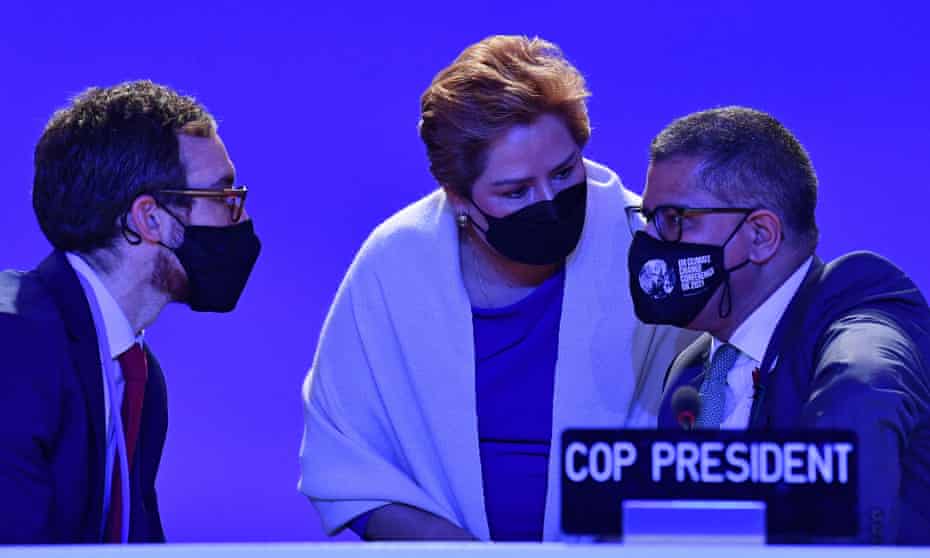Extract from The Guardian
Latest version of text, which asks nations to return next year with stronger emissions targets, will now be scrutinised by delegates.

The Cop26 president Alok Sharma, right, and UNFCCC executive secretary, Patricia Espinosa, centre, talking at the climate conference.
Nations will be asked to return next year to strengthen their targets on emissions cuts, which are so far inadequate, and to accelerate the phase-out of coal power and fossil fuel subsidies. The text was not substantially weakened overnight, but there is a long process still to go through on Saturday, and perhaps Sunday, in which some countries are likely to attack some of the key provisions.
The text of what the UK hosts said should be the final draft of the outcome of the Cop26 climate summit was released in Glasgow at about 9am on Saturday.
Delegates will pore over the decision until noon, when they will be asked for their reactions in a “stocktake”, after which the presidency will seek to move quickly to a final session at which the decisions can be adopted.
The final stages of the process will last at least until Saturday afternoon, and could stretch on much longer.
“Countries will leave Glasgow painfully aware that collectively current pledges for emissions cuts by 2030 are not ambitious enough. They are not aligned with the goal of the Paris agreement of holding the rise in warming to well below 2C degrees, and to pursue efforts to limit it to 1.5C. The draft text also still calls on all countries to accelerate efforts towards the phase-out of unabated coal power and inefficient fossil fuel subsidies.
“Importantly, the UK presidency has now published draft text that outlines a good process for agreeing a significant increase in investment in developing countries to help them make their economies zero-carbon and climate-resilient. It is time for countries to stop arguing over the text and to start taking the action that has been promised, particularly to increase the flows of financial support to developing countries.”
The mood of the talks has been generally characterised as constructive, though some nations have sought to water down agreements on seeking to phase out fossil fuels and limit global heating to 1.5C above pre industrial levels. Developing countries also want further assurances on climate finance, needed to help them cope with the impacts of extreme weather, and loss and damage, which refers to climate-related catastrophes.
The cover decision is the key outcome of the talks, outlining how countries will seek to fulfil the aims of the 2015 Paris agreement and limit greenhouse gas emissions. It was one of a raft of documents released on related issues such as adaptation to the impacts of climate breakdown, finance and some of the technical aspects of the Paris agreement, such as carbon trading.
Current national plans – known as nationally determined contributions (NDCs) – would lead to 2.4C of heating, according to an analysis this week by Climate Action Tracker.
Countries are expected to return with better pledges in 2025, under the Paris agreement, but many are now demanding the deadline should be brought forward. This is seen as the most closely fought area of disagreement as the UK hosts struggle to broker a deal.
Since the Paris agreement was signed, binding countries to limit temperature rises “well below” 2C above pre-industrial levels while “pursuing efforts” to a 1.5C limit, new science has shown that breaching the 1.5C threshold would lead to disastrous impacts, some irreversible, including the inundation of many low-lying areas. Heating has now reached 1.1C, and extreme weather is already taking hold around the world.
The Intergovernmental Panel on Climate Change has said emissions must be cut by 45% by 2030 compared with 2010 levels to stay within 1.5C.
No comments:
Post a Comment